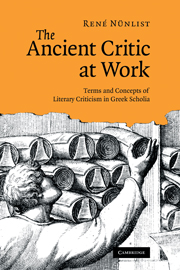Book contents
- Frontmatter
- Contents
- Acknowledgments
- Introduction
- PART I
- PART II
- 13 The gods in Homer
- 14 Homeric similes
- 15 Epithets
- 16 Type scenes
- 17 Homeric speeches
- 18 Reverse order
- 19 Staging, performance and dramaturgy
- Epilogue
- Glossary of Greek terms
- Editions of scholia
- Other abbreviations
- Bibliography
- Thematic index
- Index locorum
14 - Homeric similes
Published online by Cambridge University Press: 29 August 2009
- Frontmatter
- Contents
- Acknowledgments
- Introduction
- PART I
- PART II
- 13 The gods in Homer
- 14 Homeric similes
- 15 Epithets
- 16 Type scenes
- 17 Homeric speeches
- 18 Reverse order
- 19 Staging, performance and dramaturgy
- Epilogue
- Glossary of Greek terms
- Editions of scholia
- Other abbreviations
- Bibliography
- Thematic index
- Index locorum
Summary
It is advisable to begin the chapter on Homeric similes with a note on terminology. The following quotation can safely be said to represent the communis opinio among modern scholars:
Ancient rhetoricians appear to have had no technical term referring precisely to the figure now commonly called a ‘simile’. Although they recognized that some comparisons were introduced by words corresponding to ‘like’ and ‘as’, the distinction between these similes and other modes of comparison seems not to have been precisely correlated with any set of rhetorical terms. When similes appear in the literary treatises as illustrations of such common terms as εἰκών and similitudo, they are often in the company of other illustrative examples which do not correspond to the modern definition of simile.
(Snipes 1988: 206–7)A corresponding note indicates Snipes' debt to the study of McCall, who had come to the conclusion that:
of the four major terms of comparison – εἰκών, παραβολή, imago, and similitudo – no one of them refers appreciably more to a particular form of comparison, such as simile, than do the other three.
(McCall 1969: 258)The assumed interchangeability of the different terms causes difficulties when applied to the scholion which identifies Il. 2.87 as the ‘first simile’ (πρώτη παραβολή) of the Iliad. For it seems to ignore ‘short similes’ in book 1 such as Apollo coming to the Greek camp ‘like night’ (Il. 1.47) or Thetis emerging from the grey sea ‘like a mist’ (1.359).
- Type
- Chapter
- Information
- The Ancient Critic at WorkTerms and Concepts of Literary Criticism in Greek Scholia, pp. 282 - 298Publisher: Cambridge University PressPrint publication year: 2009



